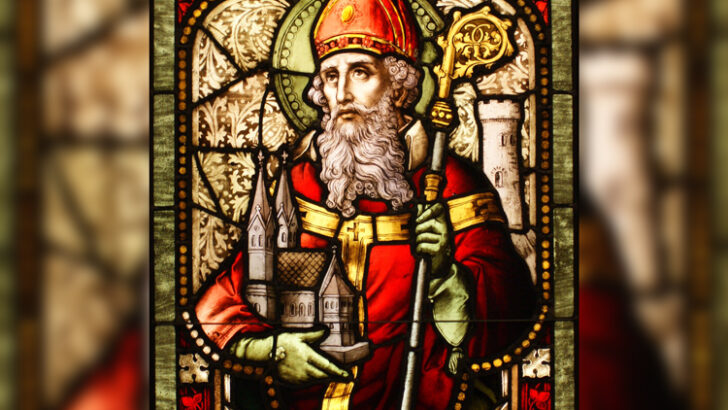It was a summer’s day in Mayo, and the heavens were weeping, when I first heard the story of John’s conversion. He had been raised in a family who lived without faith, a family with a father who drank too much.
John grew up hating his father, but like him, developed a thirst for that which cannot satisfy, a thirst, not for drink, but for money. God was not at the centre of his life for many years, but still there was an echo from his childhood, the sound of faith, from a loved one who spoke with the rhythmic prayer of his ancestors. He never forgot the words his grandmother spoke each time he visited her home: “May all the blessings of the saints of Glendalough be on you, John.”
Language
This was once the language of the faithful in Ireland. And as we come to mark the feast of all Irish saints on November 6, how desperately we need the inspiration of these treasures of the past: Patrick, Brigid, Colmcille, Dichu, Enda, Malachy, Bronagh, MacNissi, Declan, Kevin, Canice, Brendan and so many more. This is a date in the Christian calendar that should rival St Patrick’s Day, but I find few are even aware of it.
Treasures of the past was a key theme in Pope Francis’ new encyclical on the Sacred Heart, Delixit Nos (He loved us), which coincided last week with a statement by Archbishop Eamon Martin. While Peter’s successor spoke of our wealth, Patrick’s successor acknowledged our poverty. Ireland after all no longer honours the Sacred Heart as it once did, when this holy picture adorned nearly every parlour wall.
The archbishop warned that dioceses and parishes will disappear because we simply cannot meet the cost of maintaining them. Nor, he added, can we pay compensation to abuse victims without rationalisation, a grim reality that is unlikely to woo anyone back to the Church.
Let’s face it, Ireland, once the land of saints and scholars, can appear strikingly anti-Catholic”
Even so, the archbishop spoke with hope about the mission Jesus left us. “We must,” said Archbishop Eamon, “ensure the next generation believes in God.”
Persuading the next generation may be easier than reaching their parents and grandparents, as many seem quite determined to reject the faith. “It’s a generation that is hostile to the Church,” a priest friend told me a few years ago. “But the good news is the next generation are not hostile. They just don’t know anything.”
Let’s face it, Ireland, once the land of saints and scholars, can appear strikingly anti-Catholic.
Living in the north of Ireland for many years, the anti-Catholicism could be deadly. But this manifested itself in gun-toting loyalist ‘protestants’ who vented their rage by shooting at random in bars frequented by Catholics. Thank God, those days are gone, but in the new Ireland, it is baptised Catholics who are raging, and venting, and seeking to kill the Spirit.
These anti-Catholics, who are found in all corners of Ireland, wallow in their own narrative, and scapegoat the Church for all society’s ills, while sinking more deeply into a kind of nihilism that replaces faith, hope and love with fear, hopeless and indifference. They seek a new identity, a diversity and inclusion, that does not extend to Catholicism. Faith, they insist, is a private matter.
Identity
In the past the Irish could hardly speak without mentioning God because the Irish language, an expression of our identity, was so deeply entwined with faith. Remember when Mary McAleese, who speaks rather more critically these days, was publicly chastised as Irish president for using the phrase, “God willing”? That was 20 years ago this month.
The other day I came across a reflective article written a decade ago by former Irish diplomat, Eamon Delaney. He had described himself as an agnostic, non-churchgoer who, desiring a pluralist Ireland, had welcomed the emerging liberalisation. But in a case of ‘be careful what you wish for’ he was lamenting the fact that the churches were now under pressure – and that faith itself had “almost become the love that dare not speak its name”. Delaney was annoyed that an army chaplain, who had criticised Michael D. Higgins for not referencing Christmas in his Christmas message, had been forced into an apology. I sought out a few more of Delaney’s articles and was not surprised to read in 2018 in the Irish Central that he had returned to the faith, brought back by his children, who were attending Catholic school.
What is striking about John’s journey is the transforming grace of the lay faithful”
So, the Archbishop of Armagh has every reason to hope. Christ after all came not to save the righteous but sinners and Jesus is the love that cannot be silenced. It is a love, St Paul tells us in Ephesians, that will grow a Church, rooted and grounded in love.
As for John, he is now Deacon Taaffe, and a founding member of the Apostles of Love (Ireland) in the Archdiocese of Armagh. The Apostles of Love manage a diocesan initiative called The Oasis of Peace Centre in Drogheda, where lay people and clergy are partners in a mission of prayer, love and healing. What is striking about John’s journey is the transforming grace of the lay faithful.
John’s conversion was no doubt rooted in the love and prayers of his grandmother as well as the kind invitation of a friend who asked him to a prayer meeting. His conversion to Christ was deepened by the love of our Blessed Mother, and crowned with the grace of forgiveness, as he ultimately reconciled with his father, who also returned to faith.
As we mark the feast of all Irish saints, all of whom were once sinners, let us celebrate. Because we have every reason to hope – and as St Patrick himself wrote in his Confessio – to “be amazed”.
Stevie Nicks saving her career…
Singer-songwriter Stevie Nicks has opened up about her abortion, as this seems to be the defining issue of the US presidential election. She said her birth control failed in 1977 just as Fleetwood Mac was about to record their third album. “Oh no, no, no, no, no, no,” she had said, recalling her “choice” on CBS Sunday morning. She claimed that having her baby would have destroyed the band. How very sad that she ended up having four abortions. Feminists, said one commentator, describe abortion as empowering. But how many men have announced that they had to kill their child to ‘save’ their career.
The cake reflected the moon
Having just celebrated a birthday I was aghast to read in St Martin’s Magazine that the tradition of round cakes with candles is rooted in an ancient Greek offering to the goddess of the moon, Artemis. The cake reflected the moon, and the candles not only symbolised its light, but were a form of communication with the goddess. The hope was that the smoke from the candles would carry prayers to the deities. This won’t do at all! Thank God for square cakes – and frankly I can live without the mounting number of candles!


 Martina Purdy
Martina Purdy St Patrick
St Patrick 